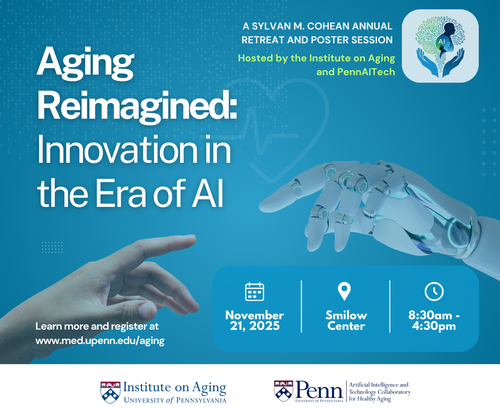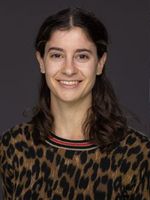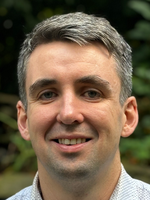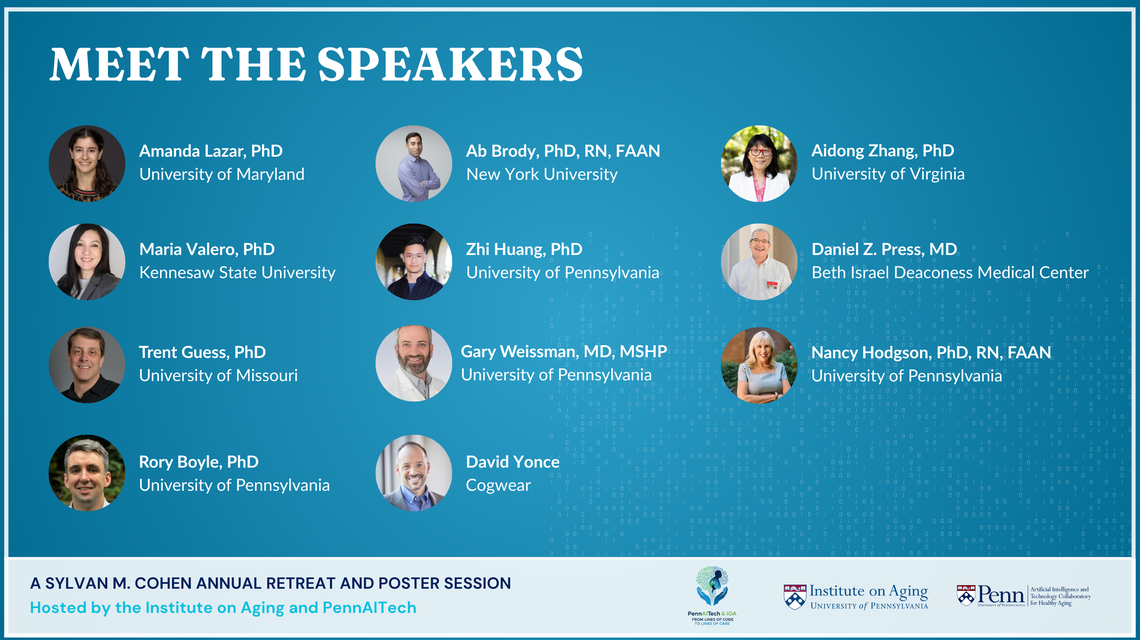 "Aging Reimagined: Innovation in the Era of AI"
"Aging Reimagined: Innovation in the Era of AI"
A Sylvan M. Cohen Annual Retreat and Poster Session
Co-sponsored by PennAITech - funded by the National Institute on Aging Grant Nr. P30AG073105
November 21, 2025
8:30am - 4:30pm
Smilow Center for Translational Research, Rubenstein Auditorium and Lobby
and online
Register to attend Submit a Poster Upload your Poster PDF
DEADLINES:
Poster submission closes November 5th.
In-person Registration closes November 11th.
Click here for more registration and poster submission information.
Meet the Speakers
 Amanda Lazar, PhD
Amanda Lazar, PhD
Amanda Lazar is an associate professor in the College of Information Studies with an affiliate appointment in the Department of Computer Science at the University of Maryland, College Park. She received her PhD from the University of Washington in Biomedical and Health Informatics. Dr. Lazar's research in the field of Human-Computer Interaction is informed by her background in health informatics and engineering. She studies the design of technology for older adults, and focuses on including the perspectives of end-users in design. Much of her work focuses on technology for meaningful engagement and purpose for people with dementia. Her work has been supported by the National Science Foundation (NSF), including a CAREER grant, and the National Institute on Disability, Independent Living, and Rehabilitation Research (NIDILRR).
 Abraham (Ab) Brody, PhD, RN, FAAN
Abraham (Ab) Brody, PhD, RN, FAAN
Abraham (Ab) Brody, PhD, RN, FAAN is Assistant Dean for Transformational Excellence in Aging, and the Mathy Mezey Professor of Geriatric Nursing and Professor of Medicine at New York University. He leads the robust Aging at NYU Meyers portfolio of geriatrics and palliative care research, education, and external programs. He is also the founder of Aliviado Health, an implementation arm of the Home of Geriatric Innovation (HIGN) focused on implementing high-quality, evidence-based care to support persons living with dementia and their care partners. Ab is uniquely situated amongst nurse scientist as a leader of two large NIH funded consortiums. As an MPI of the NIA IMPACT Collaboratory, he works to advance the science of conducting large-scale pragmatic clinical trials to improve real-world care for persons living with dementia and their care partners. As an MPI of the ASCENT Palliative Care Consortium, he helps to build the next generation of palliative care science and scientists, where he leads the consortium’s methods cores as they build and support rigorous serious illness research.
 Aidong Zhang, PhD
Aidong Zhang, PhD
Dr. Aidong Zhang is the Thomas M. Linville Professor of Computer Science in the School of Engineering and Applied Sciences at University of Virginia (UVA). She also holds joint appointments with the Department of Biomedical Engineering and School of Data Science at University of Virginia. Her research interests include machine learning, data mining, bioinformatics, and health informatics. Dr. Zhang is a fellow of ACM and IEEE, and a fellow of American Institute for Medical and Biological Engineering (AIMBE). Dr. Zhang is also a member of the Virginia Academy of Science, Engineering and Medicine.
 Maria Valero, PhD
Maria Valero, PhD
Dr. Maria Valero is associate chair for research and associate professor of Information Technology in the College of Computing and Software Engineering at Kennesaw State University (KSU). Dr. Valero is also the Program Coordinator of the Master’s in Cybersecurity Program at KSU. She received her Ph.D. in Electrical and Computer Engineering from the University of Georgia. She was an associate professor at the University of Tachira (Venezuela) from 2004 to 2015. Dr. Valero is the Director of the IoT as Service Research Group at the College of Computing and Software Engineering. Her research group investigates the use of IoT and sensor devices as a service for healthcare and cybersecurity. In the healthcare path, Dr. Valero's group focuses on implementing secure signal processing and advanced machine learning techniques to understand sensorial data for remote and non-invasively monitoring the human body and certain diseases like diabetes, heart rate complications, and brain issues. She also focuses on AI implementation for cybersecurity. She has been the lead PI of NSF, NSA, and NIH awards related to device technologies for healthcare. She was awardee (Cohort 2) of the PennAITech Collaboratory funded by NIA with the research project “GlucoCheck an non-invasive AI-powered glucose monitoring in older adults.”
 Zhi Huang, PhD
Zhi Huang, PhD
Dr. Huang is an Assistant Professor of Pathology and Laboratory Medicine, with a secondary appointment in the Department of Biostatistics, Epidemiology, and Informatics at the University of Pennsylvania Perelman School of Medicine. After receiving a PhD in Electrical and Computer Engineering from Purdue University in August 2021, he completed a postdoctoral training at Stanford University from 2021 to 2024. Dr. Huang’s research focuses on advancing AI and machine learning in medicine, including the development of vision-language foundation models for pathology (featured on the cover of Nature Medicine 2023), pathologists-AI collaboration (Nature Biomedical Engineering 2024), neurodegenerative disease research (Nature Communications 2023), as well as work on optimizing large language models (Nature 2025). His work has been covered by The New York Times, Stanford Magazine, and Stanford Scope.
 Daniel Press, MD
Daniel Press, MD
Dr. Daniel Press joined the Cognitive Neurology Unit at Beth Israel Deaconess Medical Center in 1999 and became the Chief of the Cognitive Neurology Unit in 2019. He is also a member of the BIDMC Parkinson’s Disease and Movement Disorders Center. He received board certification in neurology in 1999 and is currently an Associate Professor in Neurology at Harvard Medical School. Dr. Daniel Z. Press received his undergraduate degree from the University of Pennsylvania, majoring in the Biological Basis of Behavior, an area of sustained interest through his career. He received his medical degree from the University of Connecticut School of Medicine and trained in Neurology at the Harvard Longwood Neurology Training Program. He completed fellowships in both Behavioral Neurology (1997-1999) and Movement Disorders (1999-2000). His clinical and research interests are in neurodegenerative conditions such as Alzheimer's disease, Parkinson's disease and Lewy Body diseases. He has published extensively in these subjects and is currently conducting research projects funded by the National Institutes of Health (NIH), the Alzheimer’s Disease Discovery Foundation, and other foundations. His team was one of the first in Massachusetts to treat patients with lecanemab and he served on the FDA advisory panel reviewing donanemab, the second approved therapy to remove amyloid. He chairs the Med-Sci committee of the Massachusetts Alzheimer’s Association and is an advocate for developing new therapies to slow the progression and possibly prevent the occurrence of Alzheimer’s Disease.
 Trent Guess, PhD
Trent Guess, PhD
Dr. Trent Guess, PhD, is an Associate Professor in the Department of Physical Therapy at the University of Missouri. He holds the Encompass Health Professorship and is Director of the Mizzou Motion Analysis Center. His expertise is in musculoskeletal biomechanics and human movement. Dr. Guess is a mechanical engineer and inventor of the Mizzou Point-of-care Assessment System (MPASS). He established gait labs at two Universities and has developed unique computational methods to predict tissue loading during movement. Dr. Guess has 4 issued or pending patents in biomechanics and human movement, has published over 60 articles in this area, and is principal investigator on 21 biomechanics projects totaling over $3 million.
 Gary Weissman, MD, MSHP
Gary Weissman, MD, MSHP
Dr. Gary Weissman is an Assistant Professor of Medicine and Informatics and Core Faculty at the PAIR Center. He is also a Senior Fellow of both the Leonard Davis Institute (LDI) of Health Economics and the Penn Institute for Bioinformatics (IBI). Dr. Weissman is a practicing physician and cares for people on the medical intensive care unit at the Hospital of the University of Pennsylvania.
Dr. Weissman leads the Clinical Artificial Intelligence and Machine Learning (CAIML) Lab that develops and tests predictive clinical decision support systems using artificial intelligence (AI) and machine learning (ML) methods. The CAIML lab develops AI/ML decision support systems for ventilator management, population health management, and diagnostic excellence. He also conducts policy research related to the regulation and oversight of clinical AI/ML decision support systems. His work has been supported by NHLBI, NIGMS, NIA, and ARPA-H.
Dr. Weissman was selected by the National Academy of Medicine as a Diagnostic Excellence Scholar in 2024, is a Faculty Scientific Advisor for the Center for Precision Resource Utilization (CPRU) at the Penn Medicine Center for Health Care Transformation and Innovation (CHTI), and is the founding director of the Complete Inpatient Record using Comprehensive Electronic data (CIRCE) Project. He teaches courses every summer at Penn on clinical AI/ML and predictive modeling methods.
Dr. Weissman received his AB in Physics from Dartmouth College, completed a post-baccalaureate program at the University of Pennsylvania, and completed medical school at Sidney Kimmel Medical College, Thomas Jefferson University. He completed residency in internal medicine and a fellowship in pulmonary and critical care medicine, with a Master of Science in Health Policy Research, at the University of Pennsylvania. He lives with his wife and three children, and enjoys spending time outdoors with his family, playing ultimate frisbee, and woodworking.
 Nancy A. Hodgson, PhD, RN, FAAN,FGSA
Nancy A. Hodgson, PhD, RN, FAAN,FGSA
Dr. Nancy A Hodgson is the Claire M. Fagin Leadership Professor and Department Chair of Biobehavioral Health Sciences at the University of Pennsylvania School of Nursing. For over 30 years, Dr Hodgson’s continuously funded program of research has been focused on developing and testing evidence-based caregiving interventions for persons living with dementia. Most recently her research has focused on technology based, AI interventions. She applies implementation science approaches particularly focused on underserved communities, demonstrating that culturally-adapted interventions can achieve comparable or superior outcomes while reducing health disparities. Dr. Hodgson's work has informed national clinical practice guidelines and influenced Medicare and Medicaid reimbursement policies. She has trained thousands of healthcare providers worldwide in dementia care practice and research. She is a Fellow in the American Academy of Nursing, and the Gerontological Society of America.
 Rory Boyle, PhD
Rory Boyle, PhD
Dr. Rory Boyle is a Postdoctoral Researcher in the Penn Frontotemporal Degeneration (FTD) Center in the University of Pennsylvania. His research is focused on understanding why some people fare better than others when faced with neurodegenerative diseases such as Alzheimer's disease and FTD. Dr. Boyle completed his PhD in Trinity College Dublin in 2021, under the supervision of Dr. Robert Whelan, where he applied data science and machine learning to neuroimaging to better why some people show better-than-expected cognitive function despite similar levels of neurodegeneration. He then completed a postdoctoral fellowship in Massachusetts General Hospital and Harvard Medical School where he developed longitudinal models of resilience to Alzheimer’s disease and investigated the role of key brain networks in resilience to Alzheimer's disease. Dr. Boyle is currently working on projects that aim to understand how socioeconomic and environmental factors (e.g. neighborhood deprivation and air pollution) are related to differences in disease progression in Alzheimer's disease, FTD and amyotrophic lateral sclerosis. He is also working on a project to try and improve our measurement of biological aging, using epigenetic clocks, in under-represented populations so that we can better understand the biological mechanisms through which socioeconomic and environmental factors relate to differences in neurodegenerative disease outcomes.
 David Yonce
David Yonce
David Yonce is the CEO of Cogwear, a brain health company that improves health, peace and performance through its comfortable, wearable technology for better brain insights. David is a medical device and technology executive who has positioned companies for double-digit growth and acquisition, helped deliver over 50 new products to market, and has received 54 patents. With nearly 25 years in the medical device space, including 20 of those in a management or executive capacity, he has held diverse roles across R&D, Operations, Marketing, Strategy, and Sales at companies such as Boston Scientific, AMS, and DSM Biomedical. He also serves on the advisory boards of several
companies and counsels industry advocacy groups and multiple public seed fund initiatives. David earned a B.S. in Electrical Engineering from Cornell University, holds an M.S. in Electrical Engineering from the University of Maryland, and graduated with honors with an M.B.A. from the University of Chicago Booth School of Business.


